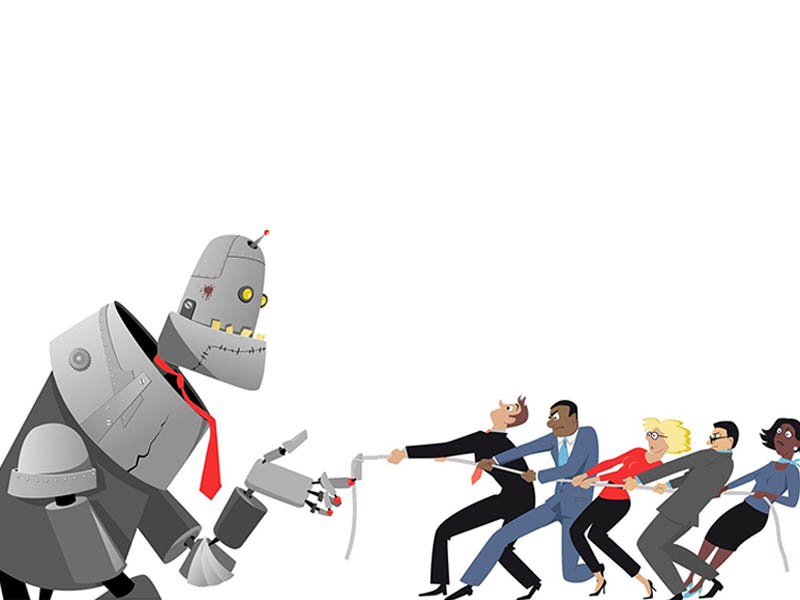Thirty years ago 1’000 robots were equipping factories worldwide. Since 2019 1.4 million of them are “working” 24/7 in our factories. Automation has already been at play since decades and more jobs were created than ever. So what will be different with AI?
Artificial Intelligence is a trendy word. But it embraces many topics from Machine Learning, Deep Learning, Big Data, Recurring Neural Networks, to Enhanced brain cells based networks and much more. But beyond pattern recognition, real AI can be explained as a self-learning system that aims at self-reflecting on the way it learns.
Based on such definition, the advantage of the human brain: self-reflection and cognitive adaptibility, is to be caught up by technology.
Jobs will be lost and you will have to work harder.
First of all: automation and self-reflecting machines will replace boring and repetitive jobs (in factories and call-center for instance), obvious. But it will also replace less boring and more complex jobs from engineering, architecture, web development to advertising, etc. Second consequence: the number of hours you’ll have to work will increase because machines and AI don’t have to stop, and the role of the future worker will be qualitative input and monitoring. Smartphones a decade ago opened the door to longer hours of work because physical work barriers disappeared.
More jobs than ever will be created and the average salary will increase.
From a military lab to your speaking fridge, the Internet adoption history is a good case to foresee the future of work with AI. Thousands of new job types were created during this period.
- New jobs to create the tools.
- New jobs to monitor the tools.
- News jobs coming from new usage. Posting something on a virtual wall was not an anticipated use of the internet, but it created new needs and tools, from advertising to data center management.
While creating a website has never been easier than today, developers have never been so well paid (>$ 200K in Silicon Valley).
- Powerful industrial revolutions create a fast and massive demand, much bigger than the total available workforce.
- The pace of technology evolution is faster than the renewal of the workforce.
Will the workforce have less power in negotiations? Will unions become obsolete?
The answer is no. Efforts on new work environments or talent management initiatives show that increase in technicality leads to increase in negotiation power for the workforce, on the condition it is organized and has the capability to foresee the labour changes.
The real catch of AI ? Exponential capital profitability.
AI and automation require lots of capital. But it also means an exponential profitability ratio. Indeed self-learning intelligence means exponential value creation with less replacement other than computational capabilites. Therefore capital investment will see higher return than work investment.
What is the direct consequence on jobs? A higher income gap.
Could Universal Basic Income (UBI) be a potential solution?
In a world where average salary will increase and capital returns will explode, the UBI cannot be a sustaining solution. The widening income gap will matter more and more. Moreover the cost of living (meaning the access to what will become basic technology to communicate, power your house or even your car) will led to a decrease in purchase power for those with a fixed “salary”. As a result UBI will only be a temporarily solution for a decent living.
Higher capital profitability, but shorter-term.
The obsolescence of machine will increase at an exponential pace, simply because computational capabilities and AI models will change at a higher pace year after year.
The capital used to acquire or produce those machines will have a shorter life cycle. Therefore investors will seek shorter-term investment returns than ever. Such a movement will be even more uncoherent with long-term fundamental research that is at the fundation of AI.
The end of capitalism?
Capitalism has been the most robust and adaptable system over the past 150 years, beating many predictions and crisis. However it is an infinite growth-based system in a world of finite resources. The question is now:
- Can AI provide us with unlimited resources?
- Can AI maximize the use of resources (and the output of resource consumption) faster than what we are actually using.
- Can AI grow without any resources?
The Kardashev scale is a method of measuring a civilization’s level of technological advancement, based on the amount of energy a civilization is able to use for communication. On such a Kardashev scale from 0 (no energy harvested at all) to 4 (the entire energy of all galaxies and all universes is harvested), humanity are “only” at 0.92.
Therefore we can already remove answers #1 and #3 above for the mid run. The remaining answer (#2) states: to have the luxury of not planning for a credible alternative solution, we will need to have AI maximizing the use of resources faster than what we are actually consuming.
Time to innovate.
This article about the threat of AI on jobs was originally published on Linkedin.
